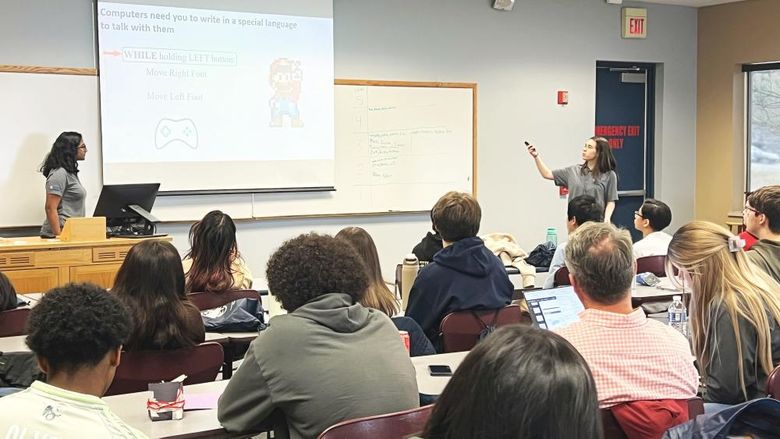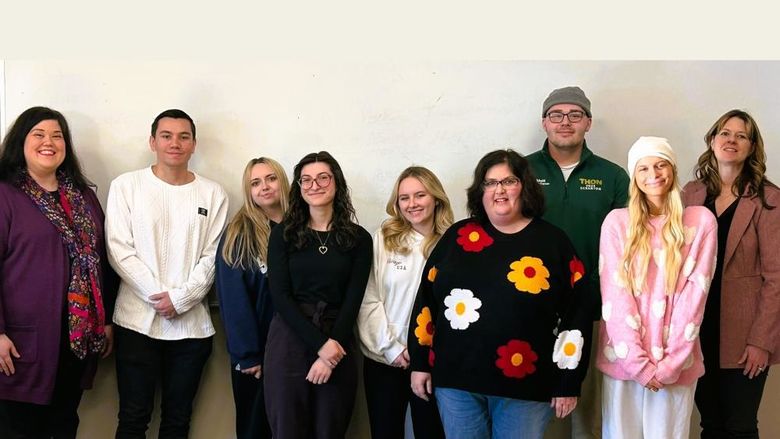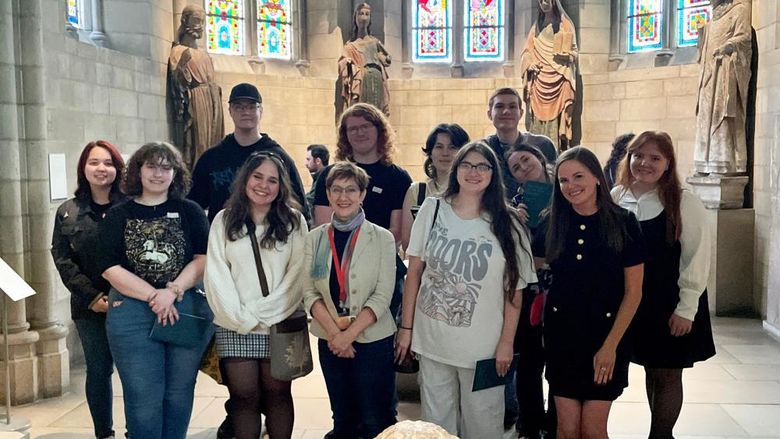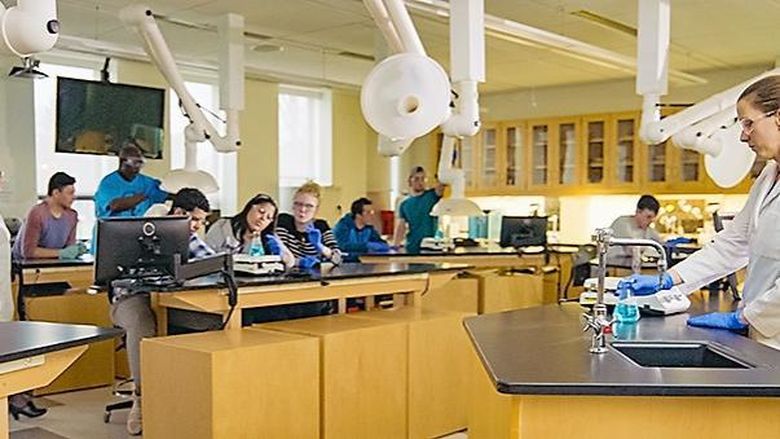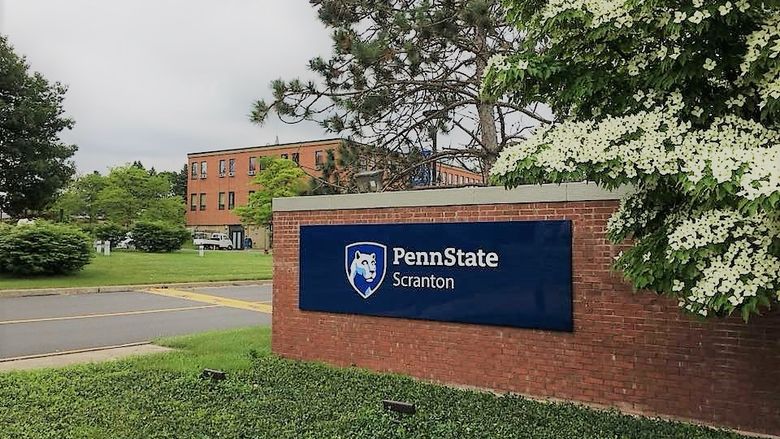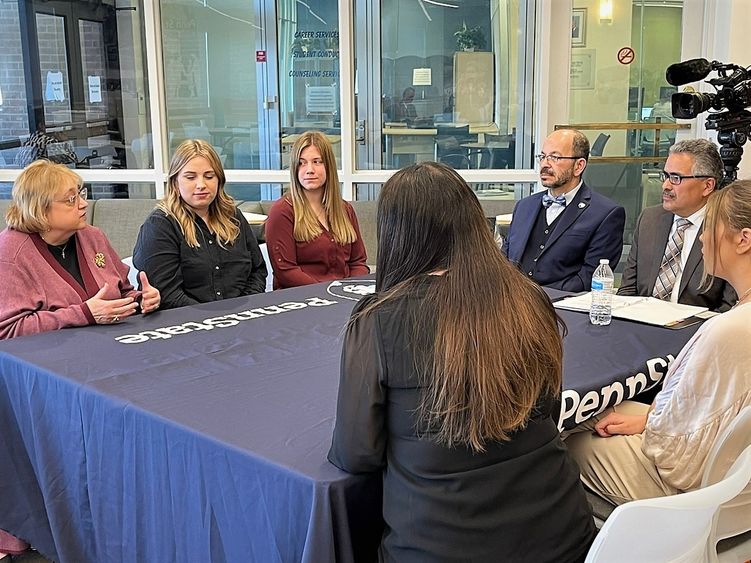
Dr. Janet Melnick, Penn State Scranton Human Development and Family Studies teaching professor and program coordinator makes a point about her experiences in the state Department of Aging's Intergenerational program that her students participated in during a roundtable discussion PDA Secretary Robert Torres.
DUNMORE, Pa. -- Pennsylvania Secretary of Aging Robert Torres visited Penn State Scranton Friday to announce the expansion of the department’s Intergenerational University Connections Program, which aims to benefit seniors, as well as the students enrolled in the campus' Human Development and Family Studies and Psychology programs. While there, he met with faculty and students already involved in the program, which was established by the PA Department of Aging (PDA) to connect college students with senior citizens at risk for the deleterious impact of social isolation on their health and well-being, with the goal of reducing the negative impact of social isolation and improving daily life of the participants. Penn State Scranton is the first university in northeast Pennsylvania to participate.
Area Agencies on Aging connect older adults with PDA to take part in the program. Undergraduate and graduate students earning degrees in programs such as social work, behavioral health, gerontology, public health, and recreational therapy are then assigned to engage with a participating senior, either over the phone or virtually. Older adults can either use their own videoconferencing technology, or they can utilize a loaner iPad with internet connectivity for the duration of the semester thanks to a PA Link grant program with TechOwl. The students earn service-learning hours, gain skills working in a telehealth environment and implement interventions while participating in a variety of activities with their assigned older adult.
"Meeting in person with students, faculty and older adults who are participating in the program highlights the positive impact the program has on everyone involved. The stories that they have shared and what they have learned from each other and about themselves has shown how valuable this program has become," said Torres. "The feedback from the universities also gives the Pennsylvania Department of Aging great insight on what works or doesn't work so we can improve the experience as we continue to build and expand this program."
“This semester, we are happy to partner with the Pennsylvania Department of Aging and their Intergenerational Program, which enables our students to practice clinical human service skills such as engagement, establishing rapport, listening skills and general clinical and ethical skills as well as administering a social isolation scale to the seniors," said Janet Melnick, teaching professor/program coordinator.
Penn State Scranton’s Human Development and Family Studies (HDFS) majors are required to complete an internship preparation course which is HDFS 401: Planning, Implementation and Evaluation of Human Services Programs. In this course, students prepare for their capstone internship experience. Students establish a relationship with their assigned senior over the course of 10 weeks. This enables the students to practice clinical human service skills such as engagement, establishing rapport, listening skills and general clinical and ethical skills as well as administering a social isolation scale to the seniors. The senior will benefit as they have been identified as being at risk for social isolation. “Social isolation has been exacerbated for the elderly as a result of the pandemic,” Melnick said, and “this program is a win-win for both the Penn State HDFS students as well as the seniors.”
HDFS students Jaclyn Fusik and Marisa Ivanko reflected on their experiences working with elders. “This was a fun and exciting new experience which I believe is beneficial for students in this program,” Fusik said, adding that it’s a priority to build rapport with clients, and having this opportunity to talk to seniors taught her how to do that in a real-life setting. “Not only was it beneficial for students, but the seniors as well, because we were there to help them with social isolation and having a new companion,” Fusik noted.
Another goal of the program is to get more young people interested in fields that involve working with and supporting older adults.
“It was a great learning experience, as I got to incorporate everything I have learned and utilize my skills in real terms” Ivanko said. She appreciated the opportunity to create a bond with her client and work out real life scenarios such as experiencing the daily life struggles of an elder and advocating for them. “Elders carry wise words and pieces of history. It is important we take care of them and allow their legacy to live on,” she remarked.
The students in Psychology 471 -- Psychology of Adjustment and Social Relationships also participated in the program. The experience is embedded in the course as a service-learning project, worth 35% of their overall grade. The students were required to read and discuss empirical research articles describing the negative impact of social isolation as well as articles about the benefits of service-learning projects at the college level. Those students were each paired with a senior citizen from Lackawanna County. They also are in contact, if necessary, with the senior’s care manager. Students began calling their seniors weekly at the end of January and have had heartwarming and amazing stories about their experiences thus far.
Additionally, students had a refresher lecture about HIPPA (the students receive training and are certified in an earlier research methods class), privacy, and when to contact the care manager or Penn State Scranton Psychology Program Coordinator Renae McNair, if necessary. The service-learning projects included weekly phone calls with their seniors and a weekly journal entry describing their experiences that week, including a self-reflection entry stating what they learned about themselves and what they learned about their senior. A few students now talk to their seniors more than the required once a week contact.
Earlier this year, students met with the Pennsylvania Department of Aging, consisting of a panel of experts including Torres, State Long-Term Care Ombudsman Margaret Barajas, Denise Getgen, director, PA Older Adult Protective Services, Stephanie Cole, special assistant to the secretary, director of special projects. The panel was a success, the students increased their knowledge and will apply what they learned from the experts. For example, one student shared that she had no idea that all the services provided by the Area Agency on Aging exist. This student just moved in with her grandmother to take care of her, and after meeting with the panel and getting helpful information and contacts, that student will now receive more support for her grandmother.
“We are very proud to be part of the Department of Aging’s Intergenerational University Connections program and see it as a positive for all involved," said Marwan Wafa, chancellor at Penn State Scranton. "Having a program like this, where there is one-on-one personal interaction between our students and older adults provides an invaluable real-world experience for our students, some of whom will one day be working with this age group, by making them more aware of the special needs of seniors, especially in regard to the isolation and loneliness that many of them are facing. Penn State Scranton is located in an area with a large number of senior citizens, and those who have participated in this program will not only be better prepared for their future careers, but also more aware of the special needs of this population and how to meet them.”
First launched as a pilot at Slippery Rock University in the fall of 2020, the Intergenerational University Connections offers students real world experience by completing service-learning projects that include engaging with older adults. The program has since expanded to Penn State Harrisburg, West Chester University, Widener University and this semester, Penn State Scranton, which is the second campus of Penn State University to join the Intergenerational University Connections program. Students in the Human Development and Family Studies major and the Psychology major, both programs within the School of Behavioral Sciences and Education, are participating.
